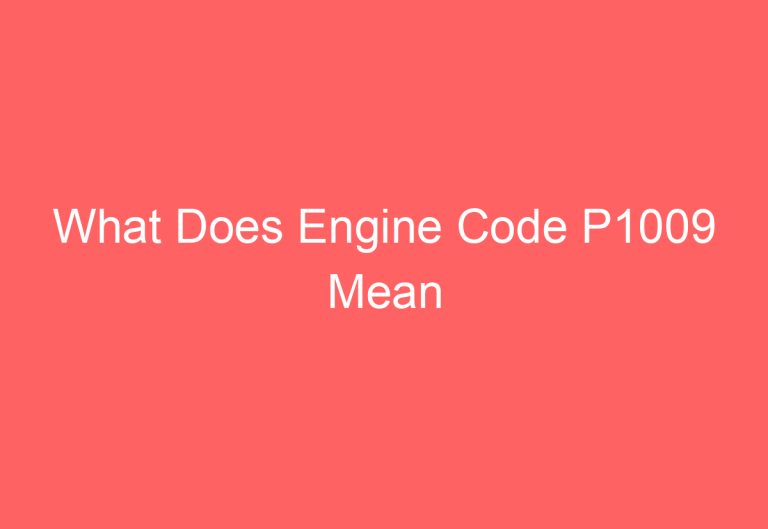What Is A Engine Code [Answered]
Engine code is a unique alphanumeric identifier assigned to a specific engine. It is used to identify the engine type, model, and year.
So What Is A Engine Code?
Engine codes are alphanumeric combinations that indicate a specific problem with a vehicle’s engine. They are usually stored in the vehicle’s computer and can be retrieved using a scan tool. Engine codes can help technicians diagnose and repair problems quickly and efficiently.
What is an Engine Code?
An Engine Code is a unique identifier
An engine code is a unique identifier assigned to a specific engine. It is used to identify the engine’s type, size, and other specifications. Engine codes are typically found on a metal plate or sticker located on the engine block. They may also be found in the owner’s manual or on the vehicle’s identification number (VIN).
Why are Engine Codes Important?
Engine codes are important for a number of reasons. They can be used to:
Identify the engine type and size
Determine the correct parts for the engine
Track the engine’s history
Research the engine’s performance
Determine the engine’s value
How to Find an Engine Code
Engine codes are typically located on a metal plate or sticker located on the engine block. They may also be found in the owner’s manual or on the vehicle’s identification number (VIN).
To find the engine code on a metal plate or sticker, look for a rectangular or square-shaped plate or sticker that is typically located on the driver’s side of the engine block. The engine code will be a series of numbers and letters.
To find the engine code in the owner’s manual, look for a section that lists the engine specifications. The engine code will be listed along with other information such as the engine type, size, and horsepower.
To find the engine code on the vehicle’s identification number (VIN), look for the 17-digit number that is stamped on the driver’s side of the dashboard. The engine code will be the sixth digit of the VIN.
Examples of Engine Codes
Here are some examples of engine codes:
Ford 4.6L V8: 4R70W
Chevrolet 5.3L V8: L5P
Toyota 2.5L I4: 2AR-FE
Honda 1.5L I4: L15B7
Conclusion
Engine codes are important for a number of reasons. They can be used to identify the engine type and size, determine the correct parts for the engine, track the engine’s history, research the engine’s performance, and determine the engine’s value. If you are ever unsure about an engine code, you can always consult with a qualified mechanic.
Also Read: What Is A P0301 Engine Code
FAQs about Engine Codes
What is an engine code?
An engine code is a unique identifier assigned to a specific engine by the manufacturer. It is typically a combination of letters and numbers, and it can be used to identify the engine’s make, model, and year.
Why do I need to know my engine code?
There are a few reasons why you might need to know your engine code. For example, if you need to order replacement parts, you will need to provide the engine code to the dealer or parts store. You may also need to know your engine code if you are trying to sell your car, or if you are having trouble with your engine.
How can I find my engine code?
There are a few different ways to find your engine code. The easiest way is to look on the vehicle identification number (VIN) plate. The VIN plate is usually located on the driver’s side doorjamb, but it can also be found on the dashboard or in the engine compartment. The engine code will be a combination of letters and numbers, and it will be located near the top of the VIN plate.
What if my engine code is worn off?
If your engine code is worn off, you can still find it by looking in your vehicle’s owner’s manual. The engine code will be listed in the manual, along with other important information about your vehicle.
What do the different letters and numbers in an engine code mean?
The letters and numbers in an engine code represent different information about the engine. The first few letters typically identify the manufacturer of the engine, while the remaining letters and numbers identify the engine’s specific model and specifications. For example, the engine code LFX is used by General Motors to identify their 3.6-liter V6 engine.
Here is a table that lists the most common engine codes and their meanings:
| Engine Code | Manufacturer | Engine |
|—|—|—|
| LFX | General Motors | 3.6-liter V6 |
| H4M | Renault | 1.6-liter turbocharged four-cylinder |
| 2GR-FE | Toyota | 3.5-liter V6 |
| K20C4 | Honda | 1.5-liter turbocharged four-cylinder |
| EA888 | Volkswagen | 2.0-liter turbocharged four-cylinder |






![Can Auto Parts Store Find Check Engine Code [Answered]](https://automotiveglory.com/wp-content/uploads/2024/05/can-auto-parts-store-find-check-engine-code-answered_6167-768x529.jpg)